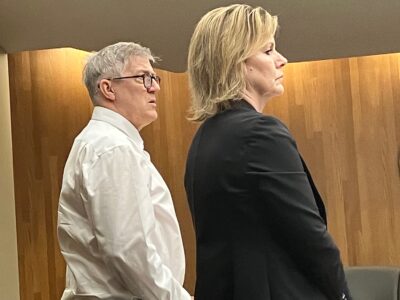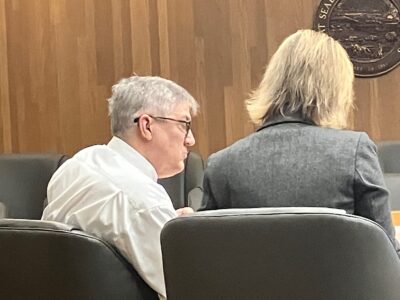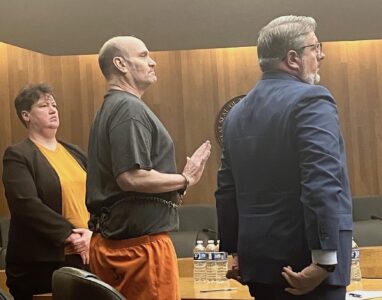Alabama man won’t face 2nd trial in Douglas County sexual extortion case after judge rules it would be double jeopardy

photo by: Chris Conde/Journal-World
Devaris L. Howard is pictured at his trial on Nov. 8, 2023, in Douglas County District Court. Howard was convicted by a jury of extorting a woman for nude photographs of herself.
A Douglas County judge ruled on Thursday that retrying an Alabama man for sexual extortion would be double jeopardy after a jury returned a split verdict in November convicting the man on one count and hanging on another.
Devaris Lamar Howard, 21, of Gadsden, Alabama, was convicted on Nov. 8, 2023, of one count of sexual extortion for blackmailing a woman into sending him nude images in connection with a series of incidents between Aug. 30, 2022, and Oct. 11, 2022. The jury was hung on a second identical count of sexual extortion, as the Journal-World reported. After the mixed verdict the state wanted to retry the hung count, and a new trial was scheduled for later this month.
On Thursday, Howard’s attorney, Cooper Overstreet, asked the court to dismiss the second count and argued that retrying Howard would violate his constitutional rights.
Continued prosecution “of Mr. Howard for this offense is in direct violation of his Fifth Amendment right to be free from double jeopardy,” Overstreet wrote in the motion.
On Thursday he said that since the charges against Howard were identical, it would be impossible to know which facts the jury relied on to convict Howard on one count of sexual extortion but not the other.
“We know this is a jury that was confused, as evidenced by the hung jury. It says that some (jurors) relied on different facts,” Overstreet said.
He said that the state, represented by Chief Assistant District Attorney Jennifer Tatum, could have added special instructions for the jury at the time of deliberations but didn’t.
Tatum said that she did specify in her closing arguments which count of extortion related to which alleged act.
At trial, the state had presented evidence of two separate incidents that it wanted the jury to consider. The first was an interaction between the victim and Howard in which Howard was alleged to have sent the woman nude photos of herself from when she was a young teen and demanded more nude photos or he would post them online. The woman testified that she did send him new photos to prevent the others from being posted, but she said that only led to additional demands for nude photos.
The second count related to those additional demands. The woman had a video call with Howard in which she was in the shower. Howard recorded that call and used it to attempt to extort more photos from the woman.
A difference between the two instances was that the woman deleted the first interactions that she had with Howard, which contained the photos of herself as a young teen, which could not be recovered by law enforcement for trial; however, when the extortion continued she began to save the messages and blackmail attempts on her phone, which she gave to police. Additional evidence of the later extortion was recovered from Howard’s phone also.
Overstreet said that it didn’t matter that Tatum specified the difference in the charges during her closing arguments because the jury is instructed not to consider closing arguments as anything other than an argument and that they must rely on the facts presented during trial.
He said since the jury was given instructions that did not differentiate the two charges, then it would be impossible to know if at a second trial a new jury would not rely on the same facts to convict as the first jury did.
Tatum said that she wished that she had included more specific dates in the jury instructions but that she believed that the jury knew which count related to which incident.
Judge Amy Hanley said that she agreed that the state was specific in its closing arguments but that the jury instructions were not entirely clear. She said that each of the counts asked the jury to find Howard guilty in connection with an image while Tatum’s closing argument mentioned images, screenshots and videos.
Hanley said regardless of whether Tatum was clear in her closing arguments, there was no way to know how her specificity affected the jury and that the written instructions the jury was required to follow listed the charges, time frames and type of image identically and that neither side asked for changes. She said there was no way to know which image or video the jury convicted Howard for.
“This is the classic double jeopardy. There is no way to go back to find out what the jury relied on,” Hanley said.
She said the issue went back to the way the charges were originally filed. Court records indicate that Tatum did not file the original charges.
Hanley said that she wanted the record to be clear that her decision was not a comment or reflection on anything beyond the legal issue at hand and not about the charges, the facts of the case or the victim.
“The jury has spoken,” she said.
Hanley then asked the parties when Howard should be sentenced and to have a status conference on a pending misdemeanor count Howard is facing for violating a protection order for allegedly trying to contact the victim during the case.
Overstreet asked to set the sentencing out a month or two so he could file post-trial motions. Hanley set a date of April 5.
According to Kansas sentencing guidelines, Howard faces a minimum of 38 months in prison unless Overstreet can present compelling evidence to Hanley that she should depart from the guidelines.
After his sentence is announced, Howard may still face extradition to Alabama. According to the Etowah County Sheriff’s Office, Howard has two active warrants in Etowah County in connection with one felony count of sex abuse and one felony count of sodomy and has a $100,000 bond in Alabama in connection with those warrants.







